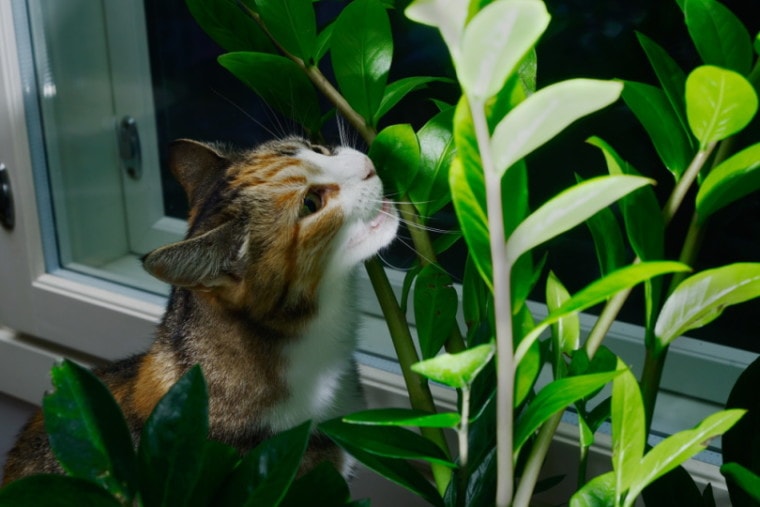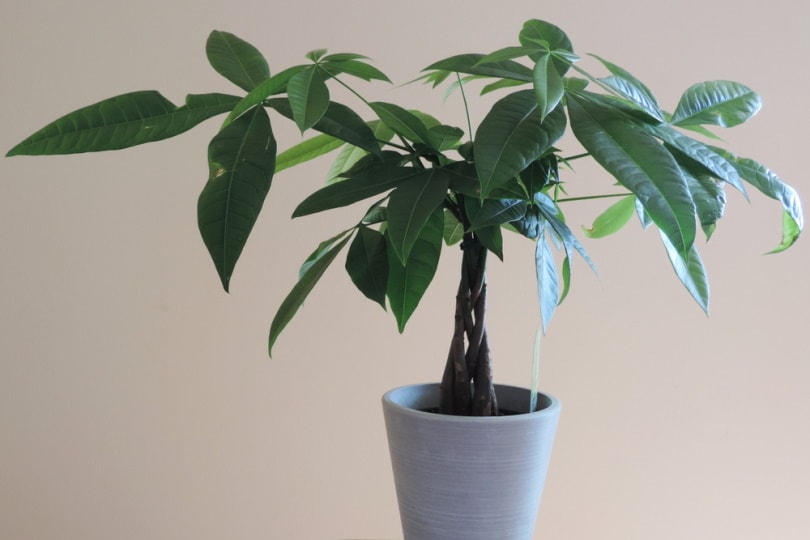
It seems that some cats didn’t get the memo that they’re carnivores. They love to bite or chew on all sorts of plants. And for us pet owners, the worry of plant poisoning is real. If your cat takes an interest in houseplants, you might be wondering which plants are safe to keep. Money trees are one of the best options for cat owners who also want houseplants. They are beautiful, easy to care for, and not toxic to cats. If you want to make sure your cat is safe from houseplant poisoning, a money tree is a great choice.
What Is a Money Tree Plant?
Money trees are a popular tropical plant with bright green leaves and braided stems, and many cats are attracted to their dangling leaves.
Why Do Cats Eat Money Trees?
Cats are obligate carnivores, but they still sometimes snack on plants.
For some cats, plant-eating is a side effect of play. These cats bite and paw at leaves for the same reason they attack feathery cat toys. Cats who paw and swipe at dangling leaves are probably bored, and introducing extra playtime into your cat’s schedule will reduce the behavior and lead to a happier cat.
Other cats might be actually snacking on plants. Although we don’t know all the reasons why cats eat plants, most cats chew on grass or other plants occasionally. This behavior is instinctive and might have evolved to keep parasites down in your kitty’s wild ancestors. This kind of houseplant snacking is more common in younger cats and in cats without access to grasses to chew on.

Disadvantages of Cats Eating Money Trees
Although money trees are not toxic to cats, there are good reasons to discourage them from eating this tropical “dish.” Although your cat may not be harmed by occasional snacking, the money tree might not be so lucky. Frequent biting or eating might damage or kill a plant.
Cats might also be harmed by pesticides, fertilizers, and other additives found in and around houseplants. Even if the money tree itself won’t poison your cat, pay attention to what is in the plant’s soil and leaves. If you think your cat has been poisoned, contact a veterinarian immediately.
Keeping Cats Away From Money Trees
If your cat has a habit of getting into houseplants, there are ways to cat-proof your potted plants. Because money trees are large indoor plants, you might not be able to put the plant out of reach of your cat. Instead, you can regularly sprinkle natural substances that repel cats, like mustard powder, pepper, or citrus oils, around your plants. A pot of cat grass might also tempt your cat away from your money tree and give it a better plant to snack on.
Knowing exactly what your feline companion can and cannot eat will help you become the best pet parent. Recognizing that not all cat bowls are equal is also key! The Hepper NomNom Cat Bowl sets itself apart from traditional options by catering to the specific needs of cats. The innovative design offers whisker relief via shallow dishes and promotes digestion with a slight bowl elevation. Find out if the Hepper NomNom is right for your cat by clicking here.
At Pet Keen, we’ve admired Hepper for many years and decided to take a controlling ownership interest so that we could benefit from the outstanding designs of this cool cat company!

Final Thoughts
There are lots of reasons why your cat might be going after plants. Whether your cat is trying to play with your plant or ingest it, the behavior is normal and instinctive.
You probably don’t want your cats eating decorative plants. It can be annoying and frustrating, especially when it harms the plant. But if your cat is eating your money tree plant, at least you don’t have to worry about poisoning.
Related Reads:
- Are Snake Plants Toxic to Cats? What You Need to Know!
- Are Croton Plants Toxic to Cats? Facts & Safety Tips
Featured Image Credit: Mikhail Olykainen, Shutterstock






